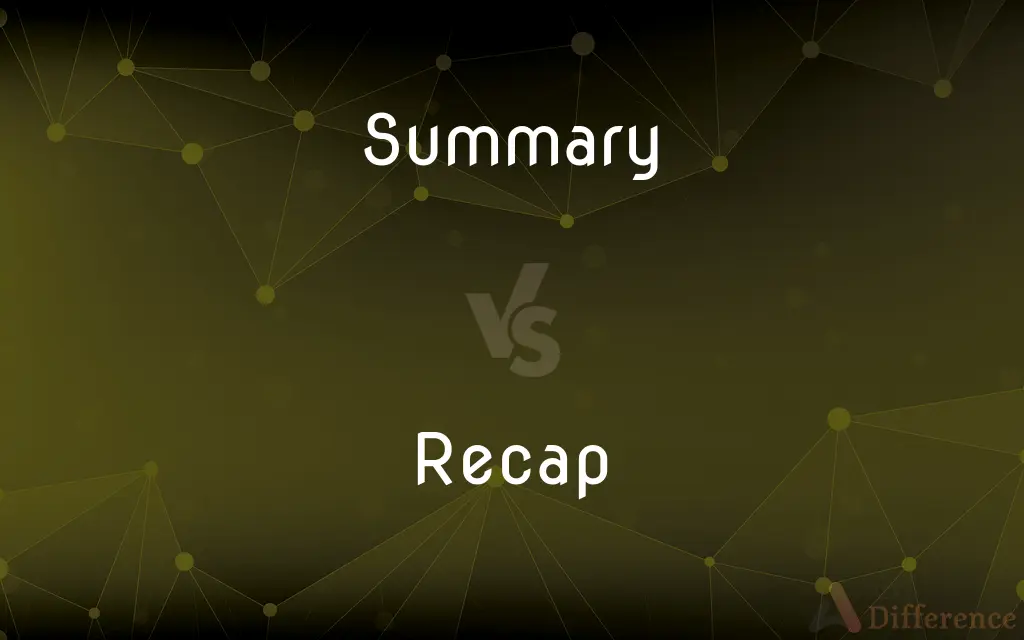Summary vs. Recap — What's the Difference?
By Tayyaba Rehman & Maham Liaqat — Updated on April 3, 2024
A summary distills the essence of a text, focusing on main points and themes, while a recap provides a detailed overview, often chronological, of events.

Difference Between Summary and Recap
Table of Contents
ADVERTISEMENT
Key Differences
A summary is a concise rendition of a larger text or discussion, capturing its core ideas and arguments without unnecessary detail. It aims to convey the essence of the original content, allowing readers to grasp the main points and conclusions efficiently. On the other hand, a recap, short for recapitulation, gives a more detailed account of events, often following the sequence in which they occurred. It serves to refresh memory or inform those who missed the original events, focusing on specifics rather than interpretations or thematic analysis.
Summaries are often used in academic and professional contexts to distill complex information into digestible pieces. They focus on the central themes, key findings, and essential arguments, removing examples, detailed explanations, and side points. Whereas recaps are common in entertainment, sports, and meetings, providing a play-by-play or blow-by-blow account that allows audiences to experience or re-experience the events with a focus on detail and progression.
The purpose of a summary is to reduce information overload, enabling readers or listeners to quickly understand the main ideas of a text or speech without going through the entire original content. This makes summaries particularly useful for synthesizing lengthy documents, research papers, or books. In contrast, recaps aim to inform or remind the audience of what happened, often used after events such as TV episodes, sports games, or series of meetings, to ensure continuity and comprehension among viewers or participants.
In terms of structure, summaries are more flexible, allowing the summarizer to reorganize content based on thematic significance rather than chronological order. This restructuring helps highlight the underlying message or argument of the original content. Conversely, recaps typically adhere to the chronological order of events, emphasizing the sequence and relationship between occurrences, which helps in reconstructing the narrative or event flow for the audience.
The writing style of a summary is generally more abstract and interpretive, integrating the summarizer's understanding of the text's main points into a coherent whole. Recaps, however, tend to be more straightforward and descriptive, often mirroring the original tone and pacing of the events to recreate the experience for the reader or listener.
ADVERTISEMENT
Comparison Chart
Purpose
To distill the core ideas and themes
To provide a detailed overview of events
Detail Level
High-level, focusing on main points
Detailed, often chronological
Common Uses
Academic texts, professional reports
Entertainment (TV, movies), sports, meetings
Focus
Main points and conclusions
Specifics of the events, including sequence
Structure
Flexible, thematic
Chronological, sequential
Writing Style
Abstract, interpretive
Straightforward, descriptive
Compare with Definitions
Summary
A concise presentation of the main points of a text.
The meeting's summary highlighted the key decisions made.
Recap
A descriptive retelling of a story or event.
Her recap of the concert captured the excitement and sequence of performances.
Summary
A brief statement of the main conclusions.
The executive summary outlines the report's recommendations.
Recap
A detailed review of an event or episode.
The game recap included all the key plays and scores.
Summary
An abstract of academic or research content.
The research paper's summary provides an overview of the study's findings.
Recap
A summary focusing on the sequence of events.
The season recap provided fans with a reminder of the storyline's progression.
Summary
A synthesis of the essential arguments presented.
His summary of the debate captured the main points argued by both sides.
Recap
A chronological account of a meeting or series.
The project recap helped team members catch up on missed details.
Summary
A condensed version of a story or article.
The summary of the novel allows readers to grasp the plot quickly.
Recap
An overview intended to refresh memory.
The lecture recap at the beginning of class helped students recall the previous lesson.
Summary
A brief statement mentioning the main points of something
A summary of our findings.
Recap
To replace a cap or caplike covering on
Recapped the bottle.
Summary
Prose that provides information in a condensed format, as by mentioning only the most significant details of a narrative
The novelist did not like writing dialogue and preferred to write stories in summary.
Recap
To restore (a used tire of a motor vehicle) to usable condition by bonding new rubber onto the worn tread and lateral surface.
Summary
Presenting the substance in a condensed form; concise
A summary review.
Recap
To recapitulate
Recapped the headlines at the end of the news broadcast.
Recapped her favorite reality show on her blog.
Summary
Performed speedily and without ceremony
Summary justice.
A summary rejection.
Recap
A tire that has been recapped.
Summary
Concise, brief or presented in a condensed form
A summary review is in the appendix.
Recap
A summary or recapitulation, as of a news report, sports contest, or television show.
Summary
Performed speedily and without formal ceremony.
They used summary executions to break the resistance of the people.
Recap
To seal (something) again with a cap.
Summary
(legal) Performed by skipping the procedures of a standard and fair trial.
Summary justice is bad justice.
Recap
To replace the worn tread on a tire by gluing a new outer portion. (US English only - Retread in UK English)
Summary
An abstract or a condensed presentation of the substance of a body of material.
Make a summary of the events
Recap
To recapitulate.
Summary
Formed into a sum; summed up; reduced into a narrow compass, or into few words; short; brief; concise; compendious; as, a summary statement of facts.
Recap
A tire that has had new tread glued on.
Summary
Hence, rapidly performed; quickly executed; as, a summary process; to take summary vengeance.
Recap
A recapitulation.
Summary
A general or comprehensive statement; an abridged account; an abstract, abridgment, or compendium, containing the sum or substance of a fuller account.
Recap
A leveraged recapitalization accomplished by increasing the debt to equity ratio.
Summary
A briefstatement that presents the main points in a concise form;
He gave a summary of the conclusions
Recap
A summary at the end that repeats the substance of a longer discussion
Summary
Performed speedily and without formality;
A summary execution
Summary justice
Recap
A used automobile tire that has been remolded to give it new treads
Summary
Briefly giving the gist of something;
A short and compendious book
A compact style is brief and pithy
Succinct comparisons
A summary formulation of a wide-ranging subject
Recap
Summarize briefly;
Let's recapitulate the main ideas
Common Curiosities
When should I use a summary instead of a recap?
Use a summary when you need to present the core ideas or conclusions of a text concisely, and a recap for detailed accounts of events.
Can a recap include analysis or interpretation?
While primarily descriptive and chronological, recaps can include brief analysis or comments, especially in reviews or detailed discussions.
What is the main difference between a summary and a recap?
The main difference is the focus; summaries distill the essence and main points, while recaps provide a detailed chronological overview.
Is a recap the same as a review?
No, a recap retells the events in detail, while a review provides an evaluation or judgment of those events.
Do summaries omit important details?
Summaries omit specific details to focus on main points, but they should capture the essential arguments and conclusions accurately.
Are summaries and recaps only written?
No, summaries and recaps can be delivered in written form, verbally, or as multimedia presentations, depending on the context.
How do summaries help in academic research?
Summaries enable researchers to quickly grasp the main ideas of a study, facilitating literature reviews and the synthesis of existing knowledge.
How long should a summary be?
A summary's length varies but should be significantly shorter than the original content, focusing only on essential points.
How do summaries and recaps complement each other?
Summaries provide a quick understanding of the main points, while recaps offer a detailed account, together offering a comprehensive view.
What makes a good recap?
A good recap accurately and vividly retells events in their sequence, including important details and moments to inform or remind the audience.
How can I improve my summarizing skills?
Practice identifying and articulating main points and themes from various texts, focusing on conciseness and clarity.
Can recaps be biased?
While recaps aim to objectively recount events, the selection of details and moments to highlight can introduce bias.
Why are summaries important in professional settings?
Summaries provide a quick way to communicate complex information, aiding decision-making and briefing in business and professional contexts.
What challenges are there in writing a recap?
Capturing all relevant details without making the recap too lengthy or losing the essence of the event can be challenging.
Can summaries and recaps be used for the same content?
Yes, both can be used to convey information about the same content, serving different purposes and audiences.
Share Your Discovery

Previous Comparison
Melt vs. Smelt
Next Comparison
Gilt vs. SowAuthor Spotlight
Written by
Tayyaba RehmanTayyaba Rehman is a distinguished writer, currently serving as a primary contributor to askdifference.com. As a researcher in semantics and etymology, Tayyaba's passion for the complexity of languages and their distinctions has found a perfect home on the platform. Tayyaba delves into the intricacies of language, distinguishing between commonly confused words and phrases, thereby providing clarity for readers worldwide.
Co-written by
Maham Liaqat













































